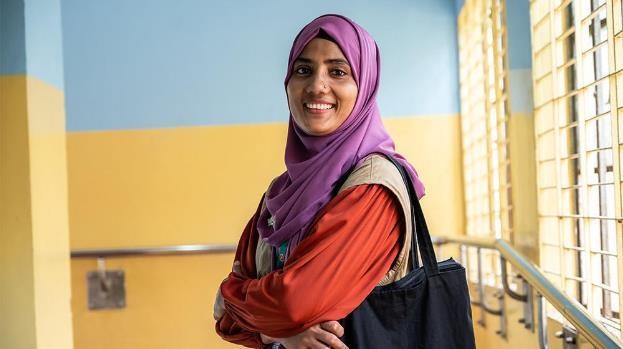Our chance to be heard

If you had the power to end violence against women through one single initiative, what would you say that initiative is? I would say, changing the mindset of the people. It is not an overnight change, rather a continuous effort by raising awareness, ensuring justice for the victims and empowering women so that they can fight back against their perpetrators and put an end to such violence.
But the problem is people do not actively think of violence against women if it is not related to them. The same old stories of beating, murder, rape and sexual assault do not appeal the news consumers anymore. But the fact is, gender-based violence (GBV) is still a grim reality in the country just as before, irrespective of the progress we claim to make for democracy and human rights.
Domestic violence is still one of the main reasons for female deaths in Bangladesh, and is mostly perpetrated by the husband. According to Ain O Salish Kendra (ASK), 155 women have been killed by their husbands between January to October 2024. During the same period, 365 women were raped, out of whom 32 died and seven committed suicide.149 women faced sexual harassment. Ain O Salish Kendra refers to reports from news-outlets as source.
Therefore, this campaign of 16 Days of Activism initiated in 1991 by the Center for Women's Global Leadership, aims to highlight and combat all forms of GBV, emphasising its pervasive impact on individuals, families and societies. It encourages advocacy, public awareness and policy change globally. In Bangladesh, a country with deeply rooted patriarchy, the relevance of this campaign is paramount. The voice of the victims and survivors must be heard.
News Media plays a pivotal role in exposing violence, holding the perpetrators accountable and supporting the victim to get justice. They can amplify the voice of the victims. As a part of the news monitoring activity, Media Resources Development Initiative (MRDI) went through the data of media coverage of 16 Days of Activism in the last two years. In 2023, the monitoring team found 18 news content featuring gender issues, not necessarily on GBV, rather on overall gender equality issues in a combined selection of 15 newspapers, television channels and online news portals. The same time frame a year ago, in 2022, the number was 113, showing a significant comparative drop in 2023. The content varied from several formats, editorial, op-ed to event-based news, success and survival stories, and on campaigns run by different organisations.
Not to generalise but gender issue is not receiving the deserved media exposure and the number of reports is declining. Thus, 16 Days of Activism is a good opportunity to evolve the mindset of the people. And the campaign can provide news media with a chance to be the catalyst for that change. This can be done by bringing the issues into the spotlight, challenging harmful societal norms and mobilising stakeholders toward creating a safer and more equitable society. If we really mean to change the scenario, we need to be vocal about the violence against women and collaborate towards a holistic approach to end the violence. GBV cannot be eliminated without going through the deeper matrix of gender inequality globally through the ages.
Working towards development of Bangladesh's news media and capacity building of journalists for two decades, MRDI found that presence of women in the news outlets and contents is still very low. In the television channels there is a significant number of women, but they are mostly news anchor and newsroom editor. Even amongst the reporters, few women are working in political, crime or business beat. The tendency of the media managers is to offer the women reporter the so called 'soft beat'. Women are also few and far in between in the decision-making level.
Consequently, MRDI took and initiative in reminding the news media to play their role. In partnership with Sweden based Fojo Media Institute, a Charter of Commitment on Gender in news media has been developed. Led by Dr. Gitiara Nasreen, Professor, Department of Mass Communication and Journalism at Dhaka University, a ten-member group consisting of journalism teachers, journalist, news media decision-makers, activists, researchers, writers, and legal experts finalised the charter. In the process, interactions with stakeholders from and outside of Dhaka focus group discussions, the perspectives and suggestions of over 100 stakeholders from both Dhaka were conducted through focus group discussions. This Charter can make the news organisations commit to ensure presence, participation, equality and equity of genders in the content and in organisation. If the news outlets commit to implement the charter by signing, we can hope it will have important implications in establishing gender equity in the news media and contribute to developing self-regulation mechanisms in the newsrooms. Even if the number of the signatories is not many, we will take it as a bold step towards achieving gender equality.
Sarwat Tarannum Nadia is the gender focal of a project aiming at improving quality journalism in Bangladesh, implemented by MRDI. She has worked as a journalist in print and electronic media for more than a decade.
Views expressed in this article are the author's own.
Follow The Daily Star Opinion on Facebook for the latest opinions, commentaries and analyses by experts and professionals. To contribute your article or letter to The Daily Star Opinion, see our guidelines for submission.




 For all latest news, follow The Daily Star's Google News channel.
For all latest news, follow The Daily Star's Google News channel. 

Comments